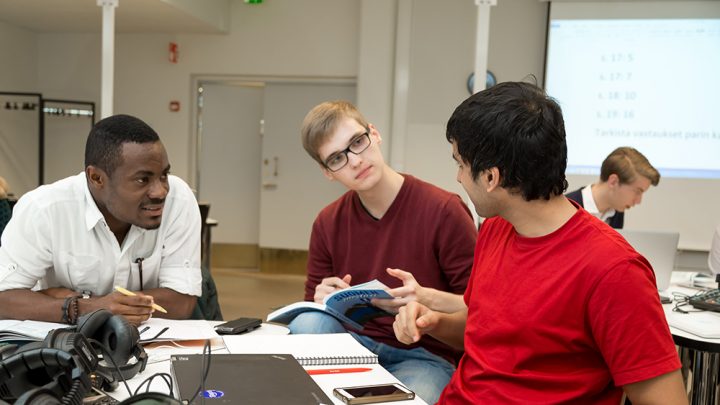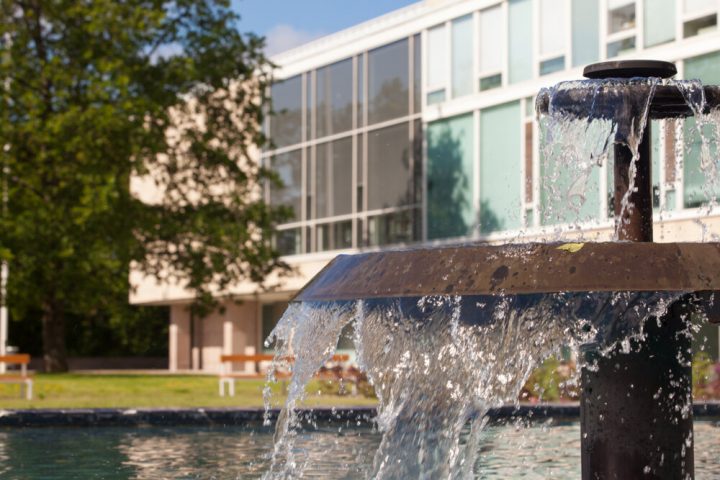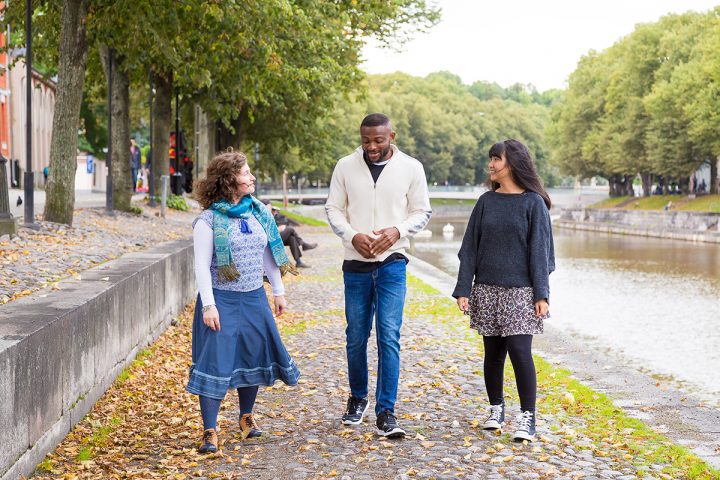10 key facts about the Education and Learning Master’s degree programme
Finding detailed information about Master’s programmes can be difficult. You’ve read the programme description and the application guidelines, but you want to know more. What is it really like to study in the programme? How big are the classes? Are the teachers supportive? To save you from the same fate, here are ten key facts about the Master’s Degree Programme in Education and Learning (or EdLearn, for short) at the University of Turku.
I certainly found the lack of information frustrating when I was trying to choose a master’s programme. I have been an EdLearn student since August 2019 and I hope that by sharing my observations about the programme, I can help you make an informed decision about whether it is the right programme for you.

1. The programme has a dual focus on learning and on educational systems
Many master’s programmes in the field of education force you to make a choice – you can study either the micro-level processes of learning and teaching, or systemic issues of educational policy and sociology. However, at the University of Turku, you can study both! The EdLearn programme is a collaboration between the Department of Teacher Education and the Department of Education. This means that in some courses you think about the learning process from the perspective of a classroom teacher, while in other courses you engage with much broader issues of educational policy.
You can personalise your studies to focus more on the micro-level (teaching and learning) or more on the macro-level (policy, sociology and organisational politics) – see point 8 below – but the compulsory courses will expose you to key ideas from both topics. This is one of my favourite things about studying here. I have always had wide-ranging interests, and the EdLearn programme has allowed me to explore the field of education from multiple viewpoints. I feel that this has given me a broader understanding of educational issues.
2. You’ll study with a diverse group of students
The EdLearn programme attracts students from all over the world – the group of 12 students who started with me in August 2019 come from eight different countries on four different continents! In addition, we often share classes with exchange students from many countries in Europe and beyond. We are also a diverse bunch in terms of where we are in our careers – some have just finished their bachelors’ degrees, others have worked for a few years before returning to university, and a few are successful mid-career professionals.
This means that everyone brings a different perspective on educational issues, and we learn from each other all the time. Many classes are structured around discussions and collaborative work, which allow us to share our experiences and build an ongoing dialogue.
3. Classes are small
The classes vary in size, but most are quite small. Some classes are exclusively for EdLearn students, which means about 12–15 students in a class. Other classes are shared with exchange students, and then the class size is 20–30 people. My smallest class is my thesis seminar, which contains only 4 students (this is unusually small, though – the other thesis seminar group is a bit bigger). The small classes mean that you get to know your classmates and teachers really well, and they get to know your strengths, weaknesses and interests.

4. The faculty is supportive and professional
I have found the teaching staff to be approachable and available. They are interested in you as a person, and they’re always willing to discuss issues further – whether you want to discuss an exciting new article over coffee, or you’re under pressure and need to renegotiate your deadlines, or you just need a theory to be explained one more time. The teachers are also punctual, professional and technologically adept.
My experiences with the university administration have also been very good. The administrative staff are friendly and helpful, and reply quickly to emails. It is possible to sort out most administrative issues online, without having to go in person to the course coordinator or Student Centre.
5. The Education and Learning programme is research-focused
There is a strong emphasis in the EdLearn programme on developing the skills you need to become an academic researcher. We take lots of courses on academic reading and writing, research methodology and data analysis. The lecturers are active researchers in their fields, so they are able to give us an insider’s view of the research process. This provides a good grounding for embarking on your own thesis research.
Master’s students are treated as junior researchers and members of the academic community. Our teachers are aware we are still learning and we will make mistakes, but they allow us the space to make our own research decisions. The teaching approach here is one of guidance, rather than telling students what to do.
The Faculty of Education is home to many research groups, organised into two broad research centres. The Centre for Research on Lifelong Learning and Education (CELE) focuses on lifelong learning, higher education, sociology and politics of education, and international comparative educational research. The Centre for Research on Learning and Instruction (CeRLI) focuses on the processes of learning and teaching, from early childhood to adulthood. Within these two centres, there are literally dozens of research projects ongoing at any point in time. The University of Turku therefore provides a rich research environment for graduate study in education.
6. Thesis supervision takes place in groups
You will start working on your thesis right from the beginning of the two-year programme. This is uncommon – in many master’s programmes, work on the thesis only starts in the second year. While it might seem intimidating to have to choose your research topic at such an early stage, it means that you will have formal supervision – and the support and guidance that comes with it – throughout the entire degree. (And there is always the option to change your thesis topic later if you change your mind about what you want to research!)
Students are divided into two groups, depending on whether their research interests align more with the Department of Education (macro-level issues) or the Department of Teacher Education (micro-level issues). Each group is assigned to a supervisor, and thesis supervision takes place in regular small-group seminars. This was new for me, because in my home country supervision is a one-on-one process. I was initially concerned that I wouldn’t get enough attention in a group supervision setting. However, my worries were groundless. The groups are small enough that you still get plenty of personal attention, and it is actually really stimulating to hear what your classmates are working on and to share ideas about the research process. The frequent meetings also encourage you to keep working.
7. The academic culture is flexible and encourages autonomy
The EdLearn programme allows students much more autonomy than I had experienced in my previous studies. Right from the start, you have considerable flexibility when it comes to what subjects you want to study. Yes, there are some compulsory courses, but you also get to choose a lot of electives, and this allows you to focus your degree on things that interest you (see point 8 for more on this). You can also choose how you want to structure your course load. For instance, you might decide to complete all your taught courses in the first year of studies, so you can focus on thesis research in the second year. You might decide to leave the third semester free of course work so that you can go on exchange. Or you might decide to spread your work load evenly across the two years.
Finnish academic culture
Finnish academic culture is also very flexible with regards to assignments. At universities in my home country, lecturers prescribe assignment topics and deadlines are very strict. Here, we are typically able to write assignments on any aspect of a course that interests us, and deadlines are always negotiable. If you need a bit more time to work on a paper, it is always an option to reach out to your teacher and ask for an extension. You can also write an exam or submit an assignment up to three times if you would like to improve your grade. This is a standard opportunity that is offered to all students – no special application is required. Learning is seen as a process, so opportunities to improve are an integral part of the system.
Finally, you are strongly encouraged to form your own opinion about the subjects, based on the research and class discussions. The EdLearn lecturers will rarely tell you what to think, or what the “right” answer is.
All of this autonomy can take a while to get used to. If (like me) you are used to being told what to do and when to do it, it can be quite unsettling at the beginning. However, help is always available if you ask for it, and there is no doubt that this approach puts you in the driving seat of your studies.

8. You can personalise your degree to suit your interests
In the EdLearn programme, you can choose your thesis topic freely. Choosing a topic that interests you is a sure way to deepen your expertise in that sphere of educational research. But there are at least three more ways you can tailor your degree to focus on topics that match your academic and professional interests.
Elective studies
- The first way is to choose electives that interest you. During your studies, you need to complete a minimum of 21 ECTS (i.e. 21 study credits) of elective studies. The Faculty of Education offers many elective courses, and if you wanted to you could easily fill up your study plan with these alone. In this way, you can learn more about the aspects of education and research that interest you most. For instance, I have completed elective courses focusing on learning difficulties, the Finnish education system, and multicultural education.
However, you are also free to take electives from other faculties. You can take them as stand-alone courses, or you can take a series of courses in the same field to complete a minor. This is a great way to broaden your expertise beyond the field of education, and the options are nearly endless. I am completing a minor in Finnish as a Foreign Language. Some of my classmates have used their electives to focus on computer programming, sustainable development, Nordic society and culture, business studies, and Spanish.
Internship
- A second way to tailor your degree is through your internship. The EdLearn programme requires you to complete an internship at an educational organisation. However, the choice of organisation is up to you. Want to gain experience teaching in Finland? You can arrange an internship at a local school. Would you rather volunteer at an educational outreach programme in rural South Africa? That’s also an option. Want to join a research group and write an article for publication in a scientific journal? Educational research is a valid internship experience. More interested in policy work? You can arrange an internship at a governmental agency. Or perhaps you want to move into higher education administration? Then apply for one of several internships available within the university itself. Honestly, the options for internships are so wide-ranging that you’re bound to come up with something that excites you.
Double degree programme
- A third way to tailor your degree is through the double degree programme. If you are accepted to the double degree programme, you complete one semester of your studies at the University of Regensburg in Germany. At the end of your studies, you will receive degrees from both the University of Turku and the University of Regensburg. The faculty at Regensburg have expertise in vocational education, continuing education, and professional learning and development – so if you’re interested in those topics, the double degree programme would be a perfect fit for you! Please note that you need to apply to the double degree programme at the same time that you apply for a study place in the EdLearn programme.
9. The Education and Learning programme prepares you for a wide range of careers
Because the programme has a joint focus on micro- and macro-level educational processes, and because it gives you a strong grounding in research skills, EdLearn graduates are prepared for work in a wide range of educational careers. Some continue in academia, doing a PhD and becoming a researcher or university teacher. Others become educational experts in the public sector or in private companies, found civil society organisations or NGOs, or take up work coordinating educational programmes.
The EdLearn degree is not a formal teaching qualification, but that doesn’t mean it’s not useful for teachers. About half of the students in my EdLearn cohort are qualified teachers who are using the programme to extend their knowledge and skills. Some hope to move into policy and administration, while others want to improve their understanding of learning and teaching, so that they can return to the classroom as better teachers.
If you are interested in staying in Finland after graduation, UTU’s Career Services (Rekry) and the trade union for educational sciences graduates (Specia) can provide you with assistance in finding a job here. The university also runs some for-credit courses that connect students with industry mentors and real-world projects in broader Finnish society.
10. You can apply for the Education and Learning programme in January!
Does EdLearn sound like it’s the right fit for you? Then apply! The application period for our International Master’s Degree Programmes is yearly in January. Check out the application requirements as soon as possible, because you need to get all your documents in order before you can apply. Studies will begin in late August.
Further resources
- Master’s Degree Programme in Education and Learning (overview page)
- Study guide (programme structure and course contents)
- Faculty of Education
- International Bachelor’s and Master’s Programmes at the University of Turku
- How and when to apply
- General information on admission
Chat with our current students!
Do you want to study at the University of Turku? Do you want to be notified about important dates and events?
Last updated 3 October 2023
Search similar blog posts by categories and keywords:

